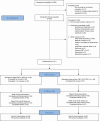Mode of delivery of Cognitive Behavioral Therapy for Insomnia: a randomized controlled non-inferiority trial of digital and face-to-face therapy
- PMID: 34291808
- PMCID: PMC8664599
- DOI: 10.1093/sleep/zsab185
Mode of delivery of Cognitive Behavioral Therapy for Insomnia: a randomized controlled non-inferiority trial of digital and face-to-face therapy
Abstract
Study objectives: Digital Cognitive Behavioral Therapy for Insomnia (dCBT-I) has demonstrated efficacy in reducing insomnia severity in self-referred and community samples. It is unknown, however, how dCBT-I compares to individual face-to-face (FtF) CBT-I for individuals referred to clinical secondary services. We undertook a randomized controlled trial to test whether fully automated dCBT-I is non-inferior to individual FtF CBT-I in reducing insomnia severity.
Methods: Eligible participants were adult patients with a diagnosis of insomnia disorder recruited from a sleep clinic provided via public mental health services in Norway. The Insomnia Severity Index (ISI) was the primary outcome measure. The non-inferiority margin was defined a priori as 2.0 points on the ISI at week 33.
Results: Individuals were randomized to FtF CBT-I (n = 52) or dCBT-I (n = 49); mean baseline ISI scores were 18.4 (SD 3.7) and 19.4 (SD 4.1), respectively. At week 33, the mean scores were 8.9 (SD 6.0) and 12.3 (SD 6.9), respectively. There was a significant time effect for both interventions (p < 0.001); and the mean difference in ISI at week 33 was -2.8 (95% CI: -4.8 to -0.8; p = 0.007, Cohen's d = 0.7), and -4.6 at week 9 (95% CI -6.6 to -2.7; p < 0.001), Cohen's d = 1.2.
Conclusions: At the primary endpoint at week 33, the 95% CI of the estimated treatment difference included the non-inferiority margin and was wholly to the left of zero. Thus, this result is inconclusive regarding the possible inferiority or non-inferiority of dCBT-I over FtF CBT-I, but dCBT-I performed significantly worse than FtF CBT-I. At week 9, dCBT-I was inferior to FtF CBT-I as the 95% CI was fully outside the non-inferiority margin. These findings highlight the need for more clinical research to clarify the optimal application, dissemination, and implementation of dCBT-I. Clinicaltrials.gov: NCT02044263: Cognitive Behavioral Therapy for Insomnia Delivered by a Therapist or on the Internet: a Randomized Controlled Non-inferiority Trial.
Keywords: Cognitive Behavioral Therapy for Insomnia; digital; face-to-face; insomnia disorder; non-inferiority; randomized controlled trial.
© Sleep Research Society 2021. Published by Oxford University Press on behalf of the Sleep Research Society.
Figures


Similar articles
-
Investigating non-inferiority of internet-delivered versus face-to-face cognitive behavioural therapy for insomnia (CBT-I): a randomised controlled trial (iSleep well).Trials. 2024 Jun 10;25(1):371. doi: 10.1186/s13063-024-08214-6. Trials. 2024. PMID: 38858707 Free PMC article.
-
Effects of digital cognitive behavioural therapy for insomnia on insomnia severity: a large-scale randomised controlled trial.Lancet Digit Health. 2020 Aug;2(8):e397-e406. doi: 10.1016/S2589-7500(20)30135-7. Lancet Digit Health. 2020. PMID: 33328044 Clinical Trial.
-
Efficacy of digital cognitive behavioural therapy for insomnia: a meta-analysis of randomised controlled trials.Sleep Med. 2020 Nov;75:315-325. doi: 10.1016/j.sleep.2020.08.020. Epub 2020 Aug 26. Sleep Med. 2020. PMID: 32950013
-
The efficacy of digital cognitive behavioral therapy for insomnia and depression: a systematic review and meta-analysis of randomized controlled trials.PeerJ. 2023 Oct 31;11:e16137. doi: 10.7717/peerj.16137. eCollection 2023. PeerJ. 2023. PMID: 37927792 Free PMC article.
-
Disseminating cognitive behavioural therapy (CBT) for insomnia at scale: capitalising on the potential of digital CBT to deliver clinical guideline care.J Sleep Res. 2023 Dec;32(6):e14025. doi: 10.1111/jsr.14025. Epub 2023 Aug 29. J Sleep Res. 2023. PMID: 37642008 Review.
Cited by
-
One-week inpatient cognitive behavioral therapy for insomnia: a retrospective study.Front Psychiatry. 2024 Aug 27;15:1440026. doi: 10.3389/fpsyt.2024.1440026. eCollection 2024. Front Psychiatry. 2024. PMID: 39257560 Free PMC article.
-
The effects of cognitive behavioral therapy for insomnia in patients with cardiovascular disease: a systematic review and meta-analysis.J Clin Sleep Med. 2025 Jul 1;21(7):1273-1284. doi: 10.5664/jcsm.11656. J Clin Sleep Med. 2025. PMID: 40114473
-
Investigating non-inferiority of internet-delivered versus face-to-face cognitive behavioural therapy for insomnia (CBT-I): a randomised controlled trial (iSleep well).Trials. 2024 Jun 10;25(1):371. doi: 10.1186/s13063-024-08214-6. Trials. 2024. PMID: 38858707 Free PMC article.
-
Comparative efficacy of onsite, digital, and other settings for cognitive behavioral therapy for insomnia: a systematic review and network meta-analysis.Sci Rep. 2023 Feb 2;13(1):1929. doi: 10.1038/s41598-023-28853-0. Sci Rep. 2023. PMID: 36732610 Free PMC article.
-
Development and Initial Evaluation of Web-Based Cognitive Behavioral Therapy for Insomnia in Rural Family Caregivers of People With Dementia (NiteCAPP): Mixed Methods Study.JMIR Aging. 2023 Aug 24;6:e45859. doi: 10.2196/45859. JMIR Aging. 2023. PMID: 37616032 Free PMC article.
References
-
- Pallesen S, et al. . A 10-year trend of insomnia prevalence in the adult Norwegian population. Sleep Med. 2014;15(2):173–179. - PubMed
-
- American Psychiatric Association. Diagnostic and Statistical Manual of Mental Disorders: DSM-5. 5th ed.Washington, DC: American Psychiatric Association; 2013.
-
- Riemann D, et al. . European guideline for the diagnosis and treatment of insomnia. J Sleep Res. 2017;26(6):675–700. - PubMed
-
- Morin CM. Cognitive behavioral therapy for chronic insomnia: state of the science versus current clinical practices. Ann Intern Med. 2015;163(3):236–237. - PubMed

